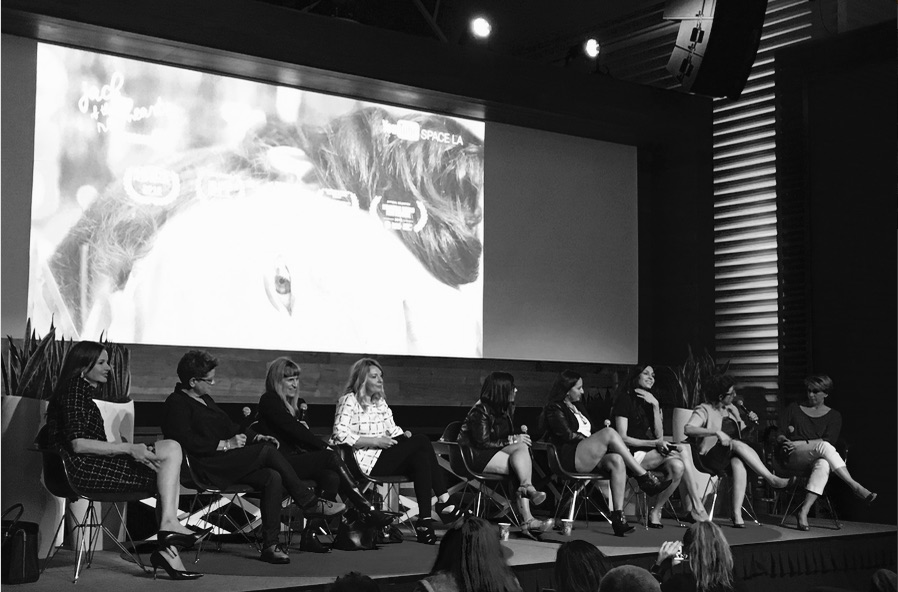On Thursday, February 25th last, I was privileged to attend a screening of “Jack Of The Red Hearts” in the company of filmmaker Janet Grillo, screenwriter Jennifer Deaton, producer Lucy Mukerjee-Brown, leading lady Famke Janssen and special guests Geena Davis (founder of the Geena Davis Institute and the Bentonville Film Festival), Oscar-nominated screenwriter Phyllis Nagy, filmmaker Catherine Hardwicke, A+E Networks SVP Danielle Carrig and “The Wrap” Founder/CEO Sharon Waxman. These wonderful women all participated in the post-screening panel.
“Jack Of The Red Hearts” is a film about what it is like to live with an autistic child. There were several things I LOVED about this movie – above all, the authenticity. It was clear the screenwriter and director had either had first-hand experience of autism, or else had done their research. The writing was great. There was not one dull or cliché character. Even the supporting male characters were complex and memorable. How I wish supporting female characters were written with the same generosity in male-centric stories. The colour palette Janet Grillo chose for the film was so bright and sunny, it brought a cheerfulness to a topic usually treated in a sombre way, and that served to place the emphasis on all the love inherent in the story.
Speaking about the strength of the mother-daughter bond depicted in her film, Janet Grillo said: “On an airplane we are told in the security drill to put masks on our own face first and then on our children, but no mother would ever do that. For me, the mother was my way into the story of “Jack Of The Red Hearts”. It was originally a secondary role, but we beefed it up.”
The film won last year’s inaugural Bentonville Film Festival (BFF), founded by the Geena Davis Institute, to promote greater diversity in filmmaking. One of the exciting aspects of this new festival is that it guarantees distribution for the winning film. Janet Grillo joked that getting distribution is even harder than making a film, so BFF’s focus on that aspect of the process is particularly welcome in the filmmaking community.
Geena Davis set up her institute years before the #OscarsSoWhite debacle; a decade ago, in fact. During the panel discussion she recounted how motherhood made her more sensitive to the both the lack and the type of female representation on screen. Wanting something better for her children, she decided to do something about it. The Geena Davis Institute lobbies the studios to reflect the population in their films and proactively supports diverse talent in the indie sector through such initiatives as the BFF.
Every woman on the panel had something fascinating to share, which gave me new insights into the film industry and left me inspired. Here are some of my personal highlights:
Geena Davis: Why haven’t there been more movies like “Thelma & Louise”? Because Hollywood does not believe men will watch women. Every time a landmark female-centric film comes along, the press showcases it as the harbinger of change. But then things stay the same. Despite all the evidence that women buy 51% of tickets and make up 51% of the audience, Hollywood still caters almost exclusively to a male audience.
Janet Grillo: The Hollywood business model is predicated on an audience of teenage boys, but teenage boys are fleeing the cinema for gaming. Hollywood does not have much product for women!
Catherine Hardwicke: I am interviewed on the topic of diversity in filmmaking every other day by journalists from all over the world. Nobody wanted to make my first film, “Thirteen”, so I just had to will it into existence.
Jennifer Deaton: I was told by a male producer that my writing wasn’t any good. I believed him and shelved my work. It took time to develop self-belief. As a writer you have to learn to discern good notes from bad.
Phyllis Nagy: While it is difficult to make your first film, it is often even harder to get the second one made. It’s taken ten years and an Oscar nomination for me to get to make my second film. “Whirlpool” is the story of the last 18 months of Welsh actor Rachel Robert’s life, leading up to her suicide in 1980. Academy Award winner Rachel Weisz will play the lead, but all I am ever asked about is who will play the male roles. There is a perception amongst investors that female actors don’t drive sales.
Famke Janssen: Awards come at the end. We need to fix things earlier on in the process. The ultimate goal is to be able to say we are a writer / director / producer without having to say “female” in front of it. Part of the problem is the lack of role models. We should be role models ourselves and support and inspire one another.
A big thank you to all the inspirational women who took part in the panel, and who continue to lead by example, and especially to screenwriting buddy Dee Chilton, who forwarded me her invite. In the UK, London Screenwriters' Festival does a phenominal job of promoting diversity in filmmaking, particularly at the script stage. It's a global event, attracting screenwriters, directors, producers and actors from all over the world. This year's festival runs from September 2nd through to September 4th. You can obtain a £23 reduction on the ticket price by quoting discount code: KTPARKER-16X

 Flux RSS
Flux RSS
